constituent assembly of india debates (proceedings)- volume vii
constituent assembly of india debates (proceedings)- volume vii
constituent assembly of india debates (proceedings)- volume vii
Create successful ePaper yourself
Turn your PDF publications into a flip-book with our unique Google optimized e-Paper software.
is enfranchised and is included in the Dehra Dun rural constituency, it is considered incapable <strong>of</strong> sending<br />
representatives to the legislature.<br />
As regards the Mirzapur District, the excluded area consists <strong>of</strong> four parganas <strong>of</strong> which only the Agori<br />
and Bijaigarh parganas have a concentration <strong>of</strong> aboriginals. The population consists <strong>of</strong> a number <strong>of</strong> tribes<br />
having affinities to the tribes in the neighbouring provinces from which they have come. There is no<br />
strong tribal life left among them. Their occupations are said to be those usually followed by the<br />
Scheduled Castes and in their religious and social customs they are similar to low-caste Hindus.<br />
The land revenue system <strong>of</strong> this area is different from the rest <strong>of</strong> the Province and is based on a<br />
plough tax. Then on-agricultural classes are gradually acquiring land from the aboriginal. The Tahsildars<br />
<strong>of</strong> the tract who exercise magisterial functions are Munsifs also. Except in relation to suits <strong>of</strong> succession<br />
and divorce, the court <strong>of</strong> the Commissioner is the highest court <strong>of</strong> appeal in civil suits. The area is under<br />
the jurisdiction <strong>of</strong> the District Board <strong>of</strong> Mirzapur.<br />
The Provincial Government are <strong>of</strong> the view that there is no justification for this area being treated<br />
differently from the rest <strong>of</strong> the province and that normal administration should be extended to it<br />
immediately.<br />
4. POLITICAL EXPERIENCE -<br />
The people <strong>of</strong> the excluded areas have no experience <strong>of</strong> local self-governing institutions <strong>of</strong> the<br />
modern or statutory type and are <strong>of</strong> course not represented in the legislature. The management <strong>of</strong> a<br />
Local Board is perhaps likely to be a much bigger undertaking for the people <strong>of</strong> these areas than the<br />
mere election <strong>of</strong> a representative to the legislature and the establishment <strong>of</strong> such bodies needs perhaps<br />
a period <strong>of</strong> <strong>of</strong>ficial guidance and control, particularly in areas like the Madras islands. The partially<br />
excluded areas on the other hand are all included in electoral constituencies <strong>of</strong> the provincial legislatures<br />
and with the exception <strong>of</strong> the Agency tracts <strong>of</strong> Madras and Orissa,* the Santhal Parganas and Jaunsar<br />
Bawar, are covered by local boards also. There are certain reserved constituencies, viz., Bihar 7, Orissa5,<br />
Madras 1, Bombay 1 and C. P. 1. In Orissa, four <strong>of</strong> the five members are selected by nomination. Unlike<br />
Assam, no reservation <strong>of</strong> seats had been made for tribals <strong>of</strong> the plains or non-excluded areas and these<br />
vote along with general Voters. In Bombay, C. P. and Chota Nagpur, the tribal though reported to be<br />
apathetic and showed aside by non-tribals, have known, at least nominally, such bodies as local boards.<br />
Nevertheless it is likely to take some time before there is sufficient interest in these bodies and probably<br />
interest in local self-government will have to be built up from the village stage. Although as shown by Mr.<br />
Grigson in his report, the tribals cast their vote as copiously as others, they have yet to learn to utilise its<br />
powers to their own advantage.<br />
-------------------------------------------------<br />
* In the Koraput District there is a District Board with the collector as president .<br />
-------------------------------------------------<br />
5. EFFECTS OF EXCLUSION -<br />
Although exclusion or partial exclusion has been in force for a number <strong>of</strong> years now, the benefits<br />
which the areas have derived from it are not particularly noticeable. In the case <strong>of</strong> the excluded areas,<br />
the sole responsibility for the administration has lain upon the Governor and the revenues earmarked for<br />
these areas have been outside the vote <strong>of</strong> the provincial legislature. No definite programme for the<br />
development <strong>of</strong> the excluded areas with a view to removing the disability <strong>of</strong> exclusion has been followed.


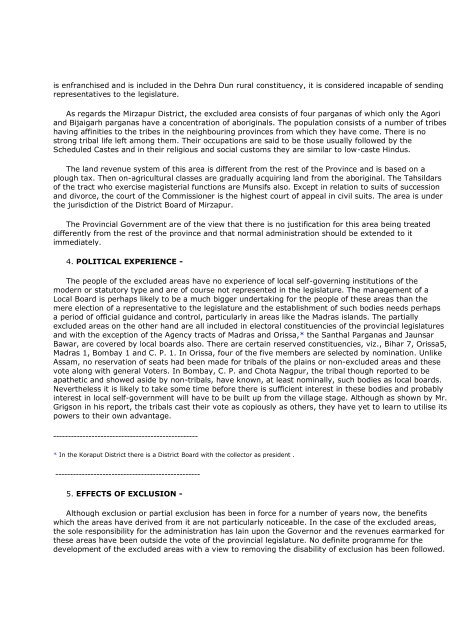
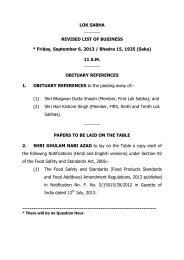
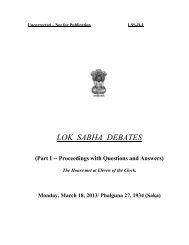
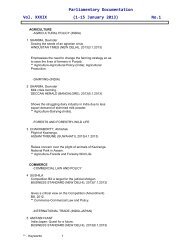
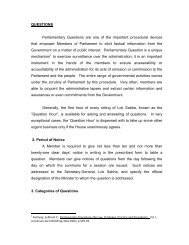
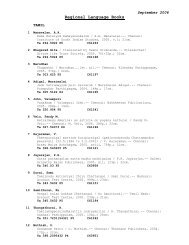
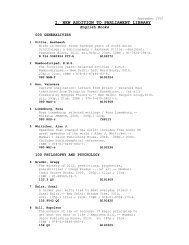
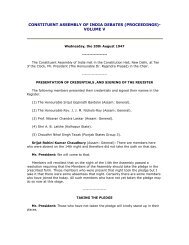
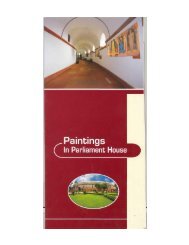
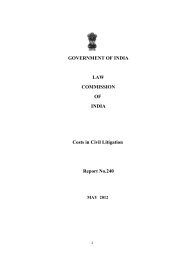
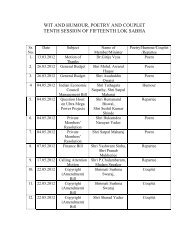
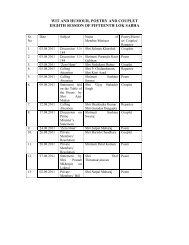

![gÉÉŌ A.]ÉŌ. xÉÉxÉÉ](https://img.yumpu.com/8015720/1/190x245/geeo-aeo-xeexee.jpg?quality=85)
